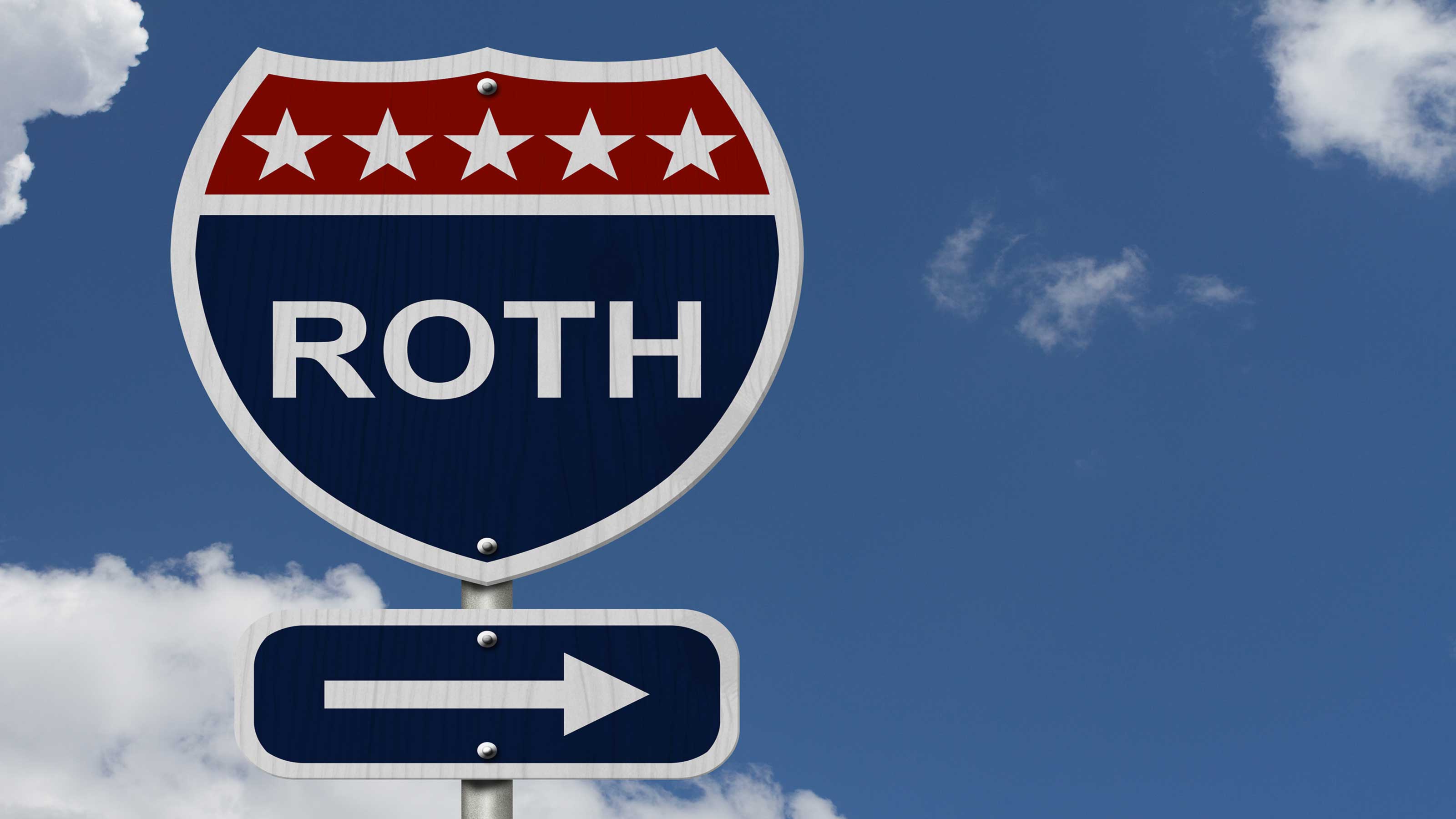8 Reasons You Need a Roth IRA Now
This celebrated investment vehicle should be a part of every smart young person's retirement plan.

Profit and prosper with the best of Kiplinger's advice on investing, taxes, retirement, personal finance and much more. Delivered daily. Enter your email in the box and click Sign Me Up.
You are now subscribed
Your newsletter sign-up was successful
Want to add more newsletters?

Delivered daily
Kiplinger Today
Profit and prosper with the best of Kiplinger's advice on investing, taxes, retirement, personal finance and much more delivered daily. Smart money moves start here.

Sent five days a week
Kiplinger A Step Ahead
Get practical help to make better financial decisions in your everyday life, from spending to savings on top deals.

Delivered daily
Kiplinger Closing Bell
Get today's biggest financial and investing headlines delivered to your inbox every day the U.S. stock market is open.

Sent twice a week
Kiplinger Adviser Intel
Financial pros across the country share best practices and fresh tactics to preserve and grow your wealth.

Delivered weekly
Kiplinger Tax Tips
Trim your federal and state tax bills with practical tax-planning and tax-cutting strategies.

Sent twice a week
Kiplinger Retirement Tips
Your twice-a-week guide to planning and enjoying a financially secure and richly rewarding retirement

Sent bimonthly.
Kiplinger Adviser Angle
Insights for advisers, wealth managers and other financial professionals.

Sent twice a week
Kiplinger Investing Weekly
Your twice-a-week roundup of promising stocks, funds, companies and industries you should consider, ones you should avoid, and why.

Sent weekly for six weeks
Kiplinger Invest for Retirement
Your step-by-step six-part series on how to invest for retirement, from devising a successful strategy to exactly which investments to choose.
Smart young savers know to participate in their companies' 401(k)s as soon as they join the workforce to benefit from as many years of saving and compounding as possible (see Why You Need a 401(k) Right Away). But really smart young savers -- including all of you who read Starting Out, obvi -- should know to save via a Roth IRA, too.
In fact, the Roth IRA is such an important retirement investment tool that it now has its own holiday. On March 27, Jeff Rose, financial planner and GoodFinancialCents.com blogger, hosted an online event, the Roth IRA Movement, which he plans to make an annual celebration. He rallied 145 other personal-finance writers to spread the good word about the star savings account and inspire rookie investors to open their own accounts. "Overall, the turnout was awesome," says Rose. "Several people have already e-mailed me and said that someone they know opened a Roth IRA because of reading a post about it."
Here are some of our favorite lessons to take away from the inaugural Roth IRA Movement:
From just $107.88 $24.99 for Kiplinger Personal Finance
Become a smarter, better informed investor. Subscribe from just $107.88 $24.99, plus get up to 4 Special Issues

Sign up for Kiplinger’s Free Newsletters
Profit and prosper with the best of expert advice on investing, taxes, retirement, personal finance and more - straight to your e-mail.
Profit and prosper with the best of expert advice - straight to your e-mail.
1. You can open a Roth no matter how young you are, as long as you have earned income. Peter Anderson points out in his Roth IRA Movement contribution, 10 Reasons Why I Love the Roth IRA (And Why You Should Too): "There isn't an age limit to have a Roth IRA, so even your children can have one!" They can, that is, as soon as they make money working, whether it be babysitting, lawn mowing, working retail or whatever.
And it's super-easy to open a Roth through your bank. Or you can try one of Kiplinger's favorite online brokers. TD Ameritrade requires no minimum initial investment and charges no maintenance fees. For your application, you'll just need your Social Security number, your employer's name and address, your checking or savings account number and bank routing number (if you want to fund the Roth IRA electronically), and your beneficiary's address and Social Security number.
2. You can withdraw Roth IRA contributions whenever you want, tax- and penalty-free. On his site, financial planner Tim Maurer writes about The Three Guarantees in Financial Planning, which he says are surprises, change and failure. And he says that the Roth IRA offers the liquidity you'll need to deal with those three guarantees. "Roth IRAs are unlike any other retirement investment bucket, for lack of a better term, as you're allowed to back money out of the account for any reason at any time at any age and without any tax consequences or penalties."
It's true -- since you pay taxes on your money before it goes into the Roth, you can withdraw your contributions whenever you need to, tax-free. (If you withdraw all of your contributions and begin dipping into earnings before the account has been open for at least five years, however, that money would be taxed and, if you're under age 59½, also hit with a penalty. There are exceptions -- more on that in a minute.) Of course, we don't recommend dipping into your retirement savings early for any frivolous reason. But in case of emergency, you'll be glad to know your money is accessible.
3. Roth withdrawals in retirement are generally tax free, unlike payouts from traditional IRAs, which are generally taxed in your top tax bracket. This unique characteristic of Roth accounts is especially advantageous for young savers. When you're just starting out, you can assume (or at least hope) that your income will go up and you'll climb to a higher tax bracket in later years. So you're better off paying taxes on contributions now rather than on withdrawals later. "The greatest wealth is created by paying taxes when the rates are lowest," writes financial planner Michael Kitces in Roth vs. Traditional: The Four Factors That Determine Which Is Best. "If rates are low today and higher in the future -- e.g., for the young worker, or someone in-between jobs -- go with the Roth and pay taxes at today's low rates."
4. You can withdraw all of your contributions and up to $10,000 of earnings to buy your first house, tax- and penalty-free, once the account has been opened for at least five years. Personal-finance blogger Kevin Mulligan writes at FreeFromBroke.com, "Because the Roth has its own special tax considerations (you contribute after you are taxed), it also has special withdrawal rules, which could be very beneficial to you."
After your account has been open for at least five years, you're free to withdraw not only your contributions but also up to $10,000 of earnings income tax-free and without penalty at any age to buy your first home. Again, we wouldn't recommend stealing these funds from your future self. But this kind of flexibility is certainly an appealing quality of the Roth.
5. Unlike a 401(k), Roth IRAs give you more flexibility to maximize your contributions to the account each year. While you're still limited to $5,000 in annual Roth contributions, you get a 16-month window to fund the account. "Perfect for procrastinators like me, the Roth IRA account type allows people to contribute to their Roth IRA right up until tax day of the following year," writes Anderson. "For example, if I wanted to start a Roth IRA and fund it for 2011, I could do that right up until April 17, 2012, the day that taxes are due for 2011." The door for 2011 contributions to 401(k) plans, on the other hand, slammed shut on December 31, 2011.
Haven't opened your own Roth yet? You could kick in $5,000 in 2011 contributions before April 17 and still add $5,000 more this year as your 2012 contribution.
6. You'll enjoy greater freedom of choice with a Roth IRA than with a company retirement plan. Anderson also notes that "a Roth IRA will usually have more investment options than your company 401(k)," for which your choices would be limited to the funds selected by your employer. You'll be free to invest in stocks, bonds, certificates of deposit, mutual funds, exchange-traded funds and more, allowing you create an appropriately diversified portfolio.
7. Leave your money to grow in a Roth your whole life long. With a 401(k) or traditional IRA, you'll typically have to make annual required minimum distributions (RMDs) once you turn 70½. Not so with a Roth IRA. "With my Roth IRA, I'm in control of when I make withdrawals," writes blogger Britt Gilette at Your Roth IRA. "I'm not forced to do anything. In fact, if I want to let my money compound tax-free until I die at age 100, I can do so."
8. Even when you're gone, your Roth IRA will still be doing good. You can pass your account funds on after you die, and "heirs get to receive this money in annual or lump-sum distributions in the same tax-free way that you would have," writes financial planner Frances St. Onge at All Things Financial Planning Blog. "By contrast, if they receive your 401(k) or IRA as an inheritance, they will have to pay taxes on the amount withdrawn each year, just like you did."
For more about the Roth IRA Movement, see GoodFinancialCents.com and #RothIRAMovement on Twitter.
Follow Stacy and the whole Starting Out Kiplinger team on Twitter.
Profit and prosper with the best of Kiplinger's advice on investing, taxes, retirement, personal finance and much more. Delivered daily. Enter your email in the box and click Sign Me Up.

Rapacon joined Kiplinger in October 2007 as a reporter with Kiplinger's Personal Finance magazine and became an online editor for Kiplinger.com in June 2010. She previously served as editor of the "Starting Out" column, focusing on personal finance advice for people in their twenties and thirties.
Before joining Kiplinger, Rapacon worked as a senior research associate at b2b publishing house Judy Diamond Associates. She holds a B.A. degree in English from the George Washington University.
-
 Dow Adds 1,206 Points to Top 50,000: Stock Market Today
Dow Adds 1,206 Points to Top 50,000: Stock Market TodayThe S&P 500 and Nasdaq also had strong finishes to a volatile week, with beaten-down tech stocks outperforming.
-
 Ask the Tax Editor: Federal Income Tax Deductions
Ask the Tax Editor: Federal Income Tax DeductionsAsk the Editor In this week's Ask the Editor Q&A, Joy Taylor answers questions on federal income tax deductions
-
 States With No-Fault Car Insurance Laws (and How No-Fault Car Insurance Works)
States With No-Fault Car Insurance Laws (and How No-Fault Car Insurance Works)A breakdown of the confusing rules around no-fault car insurance in every state where it exists.
-
 Why You Need a Roth IRA
Why You Need a Roth IRARoth IRAs With this indispensable savings tool, your money grows tax-free, you can invest in almost anything and you get several cool perks.
-
 6 Savings Tips for Millennials Who Want to Retire Rich
6 Savings Tips for Millennials Who Want to Retire Richretirement Take advantage of the decades you have before retirement to establish good savings habits and benefit from the magic of compounding.
-
 The Best Money Advice My Dad Ever Gave Me
The Best Money Advice My Dad Ever Gave Meretirement Papa Rapacon has successfully retired by taking calculated risks and educating himself about finances.
-
 Free Money for Retirement
Free Money for Retirementretirement If your company matches contributions, you’ve got a head start.
-
 10 Financial Commandments for Your 30s
10 Financial Commandments for Your 30spersonal finance After establishing a solid financial foundation in your 20s, use the next decade of your life to keep building and protecting your wealth.
-
 Start Saving Now
Start Saving Nowsavings Get in the habit early, even if it’s only a small amount with each paycheck.
-
 10 Financial Commandments for Your 20s
10 Financial Commandments for Your 20spersonal finance Tend to these tasks now to achieve your financial independence later.
-
 What to Do in Case of Financial Emergency
What to Do in Case of Financial EmergencyBudgeting If you have yet to build up an emergency fund, consider these options to help cover any big, unexpected costs.